Person-Centered Care: A Nursing Student's Reflection on an Episode
VerifiedAdded on 2023/06/11
|5
|1079
|207
Essay
AI Summary
This essay presents a nursing student's reflective analysis of an episode of care, focusing on the importance of verbal information delivery and person-centered care. It highlights the role of registered nurses in providing compassionate, evidence-based care and coordinating with other healthcare professionals. Effective communication is identified as central to safe and compassionate care, particularly when assessing vulnerable patients with complex needs. The reflection emphasizes how learnings from care episodes can enhance support in case planning, self-medication assessments, and building rapport with patients. Ultimately, the essay underscores the significance of communication and relationship management skills in all aspects of nursing care, contributing to the student's professional development and proficiency.
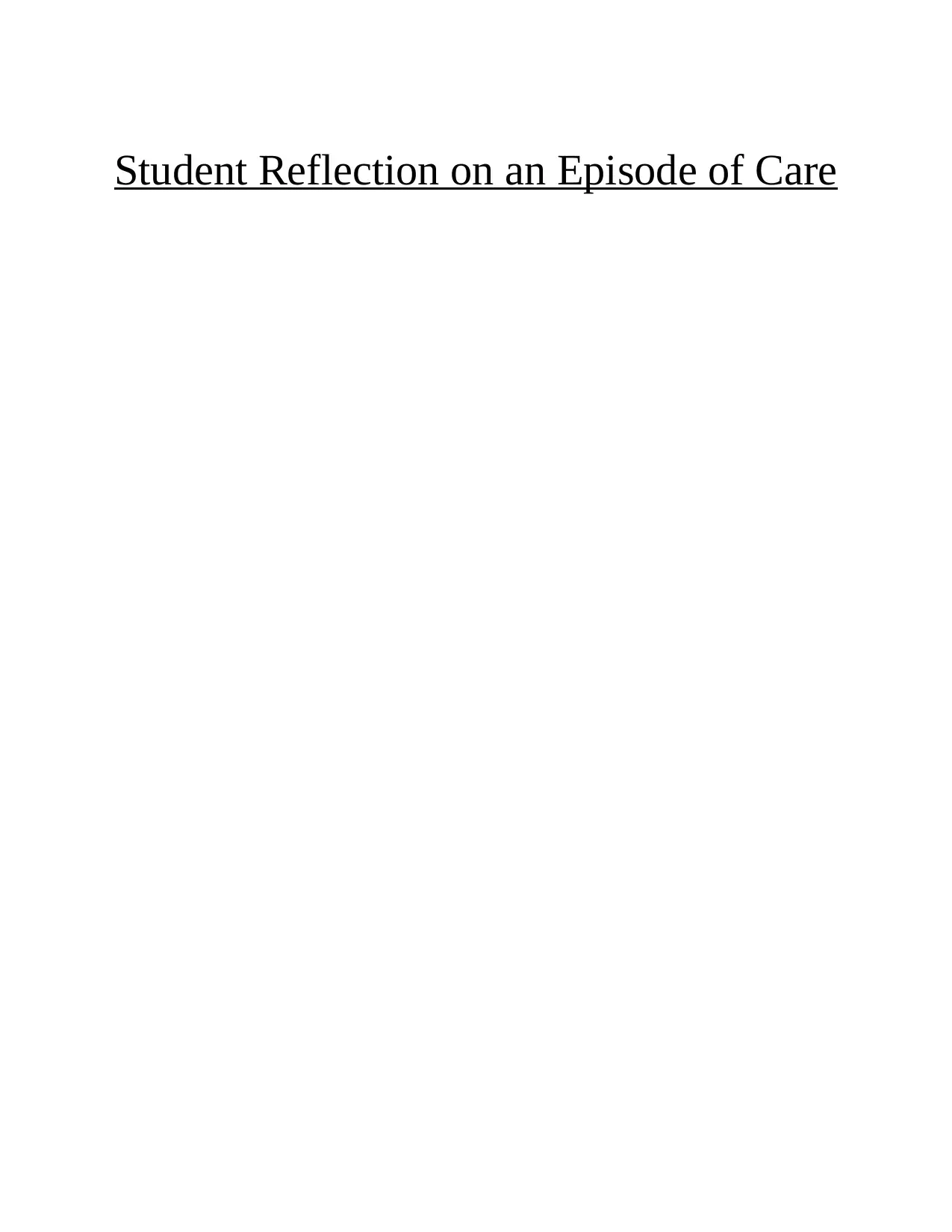
Student Reflection on an Episode of Care
Paraphrase This Document
Need a fresh take? Get an instant paraphrase of this document with our AI Paraphraser
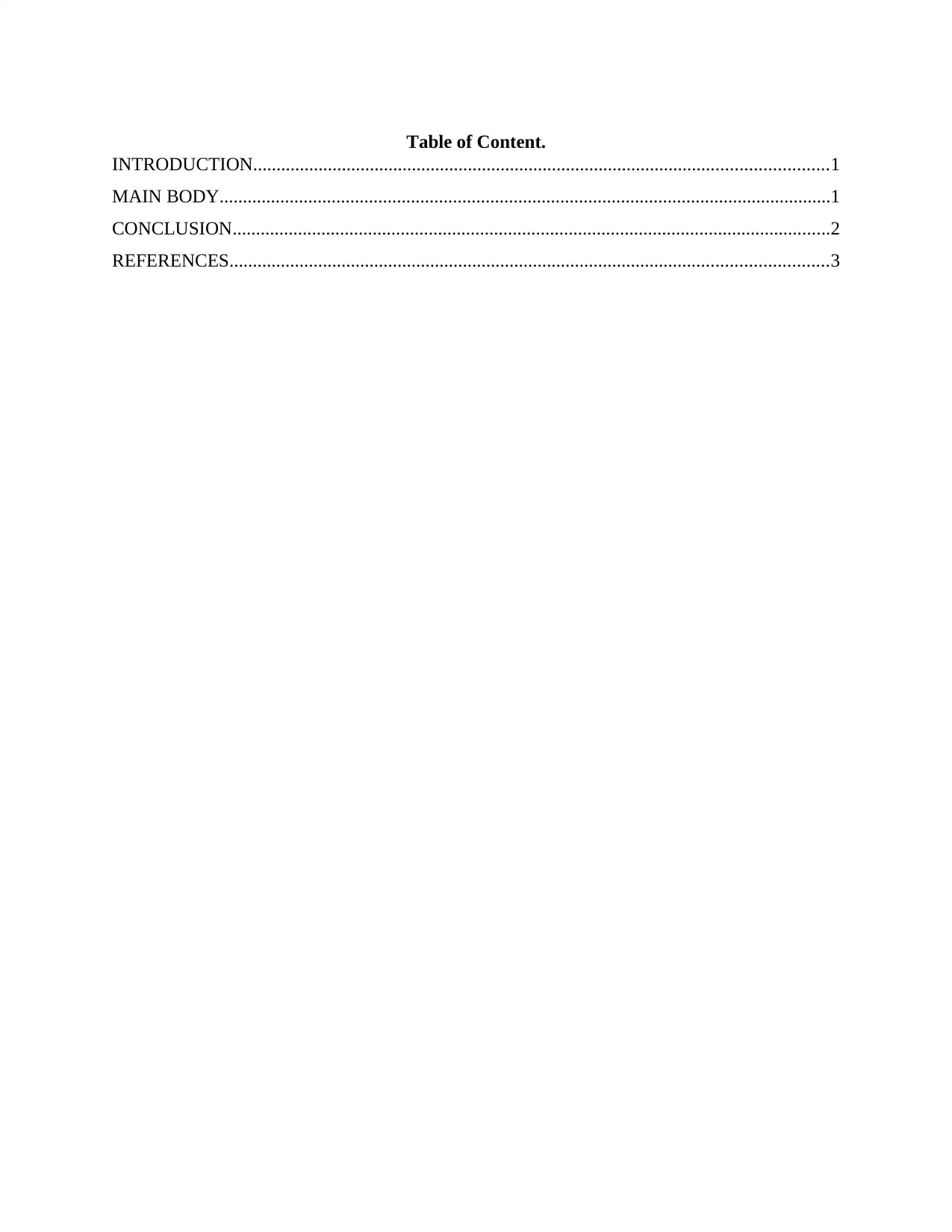
Table of Content.
INTRODUCTION...........................................................................................................................1
MAIN BODY...................................................................................................................................1
CONCLUSION................................................................................................................................2
REFERENCES................................................................................................................................3
INTRODUCTION...........................................................................................................................1
MAIN BODY...................................................................................................................................1
CONCLUSION................................................................................................................................2
REFERENCES................................................................................................................................3
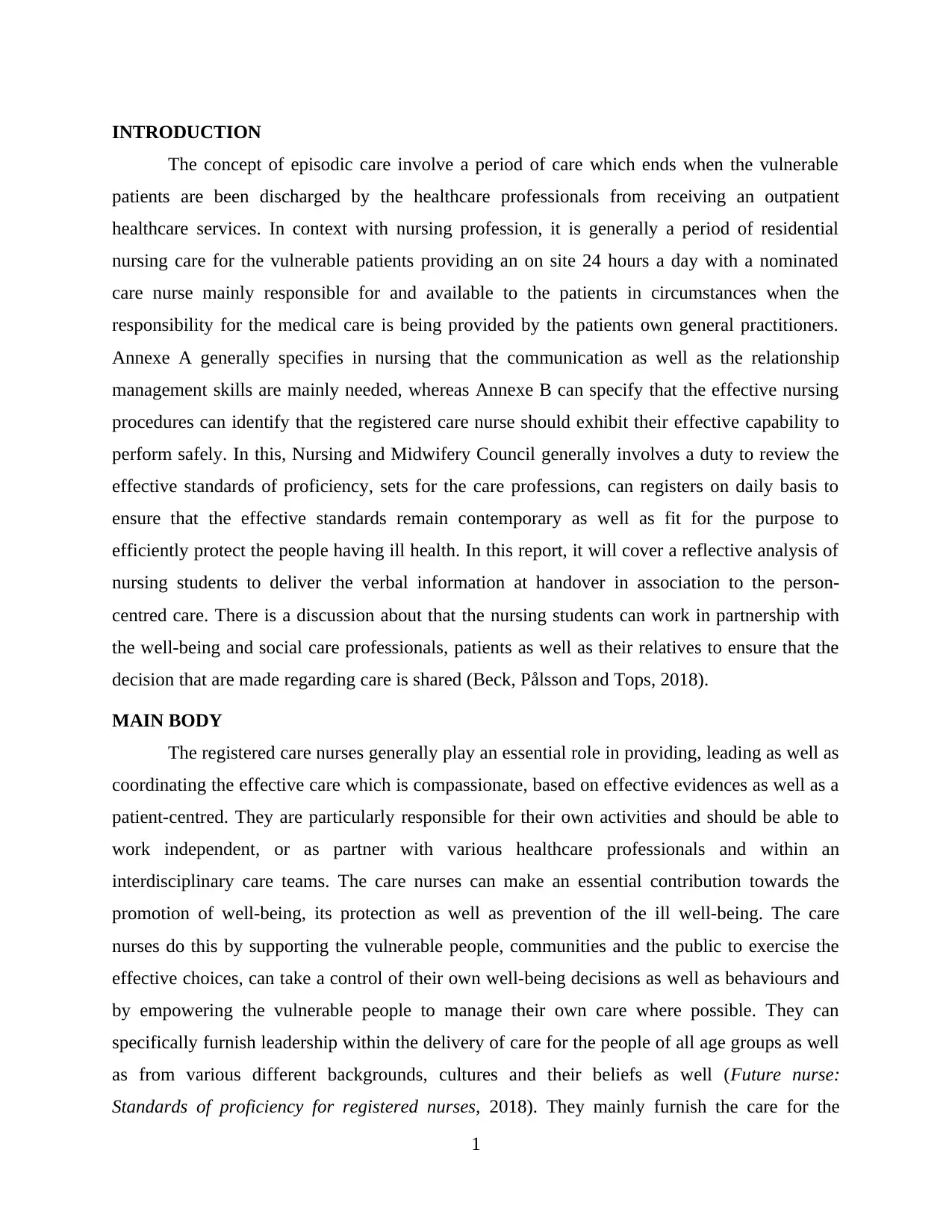
INTRODUCTION
The concept of episodic care involve a period of care which ends when the vulnerable
patients are been discharged by the healthcare professionals from receiving an outpatient
healthcare services. In context with nursing profession, it is generally a period of residential
nursing care for the vulnerable patients providing an on site 24 hours a day with a nominated
care nurse mainly responsible for and available to the patients in circumstances when the
responsibility for the medical care is being provided by the patients own general practitioners.
Annexe A generally specifies in nursing that the communication as well as the relationship
management skills are mainly needed, whereas Annexe B can specify that the effective nursing
procedures can identify that the registered care nurse should exhibit their effective capability to
perform safely. In this, Nursing and Midwifery Council generally involves a duty to review the
effective standards of proficiency, sets for the care professions, can registers on daily basis to
ensure that the effective standards remain contemporary as well as fit for the purpose to
efficiently protect the people having ill health. In this report, it will cover a reflective analysis of
nursing students to deliver the verbal information at handover in association to the person-
centred care. There is a discussion about that the nursing students can work in partnership with
the well-being and social care professionals, patients as well as their relatives to ensure that the
decision that are made regarding care is shared (Beck, Pålsson and Tops, 2018).
MAIN BODY
The registered care nurses generally play an essential role in providing, leading as well as
coordinating the effective care which is compassionate, based on effective evidences as well as a
patient-centred. They are particularly responsible for their own activities and should be able to
work independent, or as partner with various healthcare professionals and within an
interdisciplinary care teams. The care nurses can make an essential contribution towards the
promotion of well-being, its protection as well as prevention of the ill well-being. The care
nurses do this by supporting the vulnerable people, communities and the public to exercise the
effective choices, can take a control of their own well-being decisions as well as behaviours and
by empowering the vulnerable people to manage their own care where possible. They can
specifically furnish leadership within the delivery of care for the people of all age groups as well
as from various different backgrounds, cultures and their beliefs as well (Future nurse:
Standards of proficiency for registered nurses, 2018). They mainly furnish the care for the
1
The concept of episodic care involve a period of care which ends when the vulnerable
patients are been discharged by the healthcare professionals from receiving an outpatient
healthcare services. In context with nursing profession, it is generally a period of residential
nursing care for the vulnerable patients providing an on site 24 hours a day with a nominated
care nurse mainly responsible for and available to the patients in circumstances when the
responsibility for the medical care is being provided by the patients own general practitioners.
Annexe A generally specifies in nursing that the communication as well as the relationship
management skills are mainly needed, whereas Annexe B can specify that the effective nursing
procedures can identify that the registered care nurse should exhibit their effective capability to
perform safely. In this, Nursing and Midwifery Council generally involves a duty to review the
effective standards of proficiency, sets for the care professions, can registers on daily basis to
ensure that the effective standards remain contemporary as well as fit for the purpose to
efficiently protect the people having ill health. In this report, it will cover a reflective analysis of
nursing students to deliver the verbal information at handover in association to the person-
centred care. There is a discussion about that the nursing students can work in partnership with
the well-being and social care professionals, patients as well as their relatives to ensure that the
decision that are made regarding care is shared (Beck, Pålsson and Tops, 2018).
MAIN BODY
The registered care nurses generally play an essential role in providing, leading as well as
coordinating the effective care which is compassionate, based on effective evidences as well as a
patient-centred. They are particularly responsible for their own activities and should be able to
work independent, or as partner with various healthcare professionals and within an
interdisciplinary care teams. The care nurses can make an essential contribution towards the
promotion of well-being, its protection as well as prevention of the ill well-being. The care
nurses do this by supporting the vulnerable people, communities and the public to exercise the
effective choices, can take a control of their own well-being decisions as well as behaviours and
by empowering the vulnerable people to manage their own care where possible. They can
specifically furnish leadership within the delivery of care for the people of all age groups as well
as from various different backgrounds, cultures and their beliefs as well (Future nurse:
Standards of proficiency for registered nurses, 2018). They mainly furnish the care for the
1
⊘ This is a preview!⊘
Do you want full access?
Subscribe today to unlock all pages.

Trusted by 1+ million students worldwide
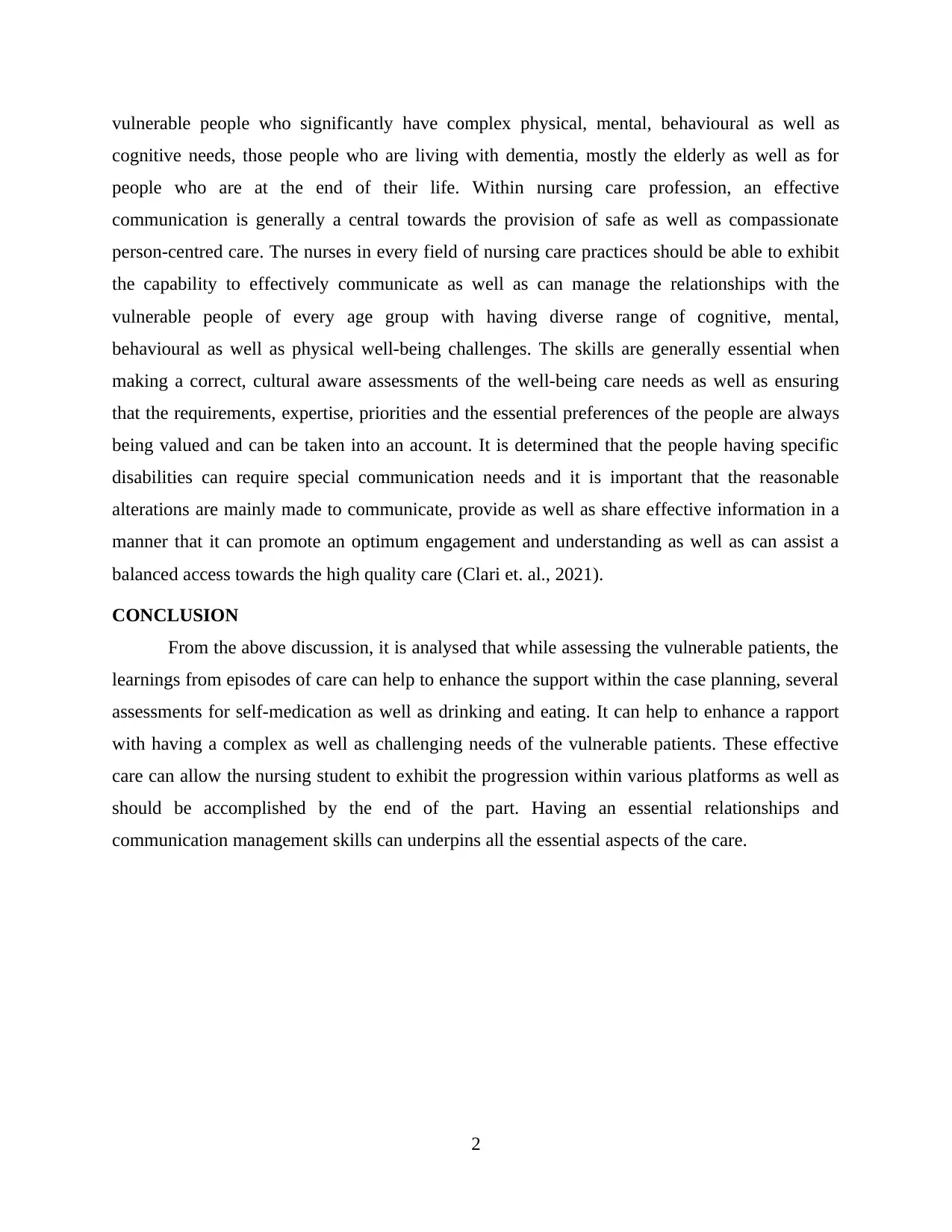
vulnerable people who significantly have complex physical, mental, behavioural as well as
cognitive needs, those people who are living with dementia, mostly the elderly as well as for
people who are at the end of their life. Within nursing care profession, an effective
communication is generally a central towards the provision of safe as well as compassionate
person-centred care. The nurses in every field of nursing care practices should be able to exhibit
the capability to effectively communicate as well as can manage the relationships with the
vulnerable people of every age group with having diverse range of cognitive, mental,
behavioural as well as physical well-being challenges. The skills are generally essential when
making a correct, cultural aware assessments of the well-being care needs as well as ensuring
that the requirements, expertise, priorities and the essential preferences of the people are always
being valued and can be taken into an account. It is determined that the people having specific
disabilities can require special communication needs and it is important that the reasonable
alterations are mainly made to communicate, provide as well as share effective information in a
manner that it can promote an optimum engagement and understanding as well as can assist a
balanced access towards the high quality care (Clari et. al., 2021).
CONCLUSION
From the above discussion, it is analysed that while assessing the vulnerable patients, the
learnings from episodes of care can help to enhance the support within the case planning, several
assessments for self-medication as well as drinking and eating. It can help to enhance a rapport
with having a complex as well as challenging needs of the vulnerable patients. These effective
care can allow the nursing student to exhibit the progression within various platforms as well as
should be accomplished by the end of the part. Having an essential relationships and
communication management skills can underpins all the essential aspects of the care.
2
cognitive needs, those people who are living with dementia, mostly the elderly as well as for
people who are at the end of their life. Within nursing care profession, an effective
communication is generally a central towards the provision of safe as well as compassionate
person-centred care. The nurses in every field of nursing care practices should be able to exhibit
the capability to effectively communicate as well as can manage the relationships with the
vulnerable people of every age group with having diverse range of cognitive, mental,
behavioural as well as physical well-being challenges. The skills are generally essential when
making a correct, cultural aware assessments of the well-being care needs as well as ensuring
that the requirements, expertise, priorities and the essential preferences of the people are always
being valued and can be taken into an account. It is determined that the people having specific
disabilities can require special communication needs and it is important that the reasonable
alterations are mainly made to communicate, provide as well as share effective information in a
manner that it can promote an optimum engagement and understanding as well as can assist a
balanced access towards the high quality care (Clari et. al., 2021).
CONCLUSION
From the above discussion, it is analysed that while assessing the vulnerable patients, the
learnings from episodes of care can help to enhance the support within the case planning, several
assessments for self-medication as well as drinking and eating. It can help to enhance a rapport
with having a complex as well as challenging needs of the vulnerable patients. These effective
care can allow the nursing student to exhibit the progression within various platforms as well as
should be accomplished by the end of the part. Having an essential relationships and
communication management skills can underpins all the essential aspects of the care.
2
Paraphrase This Document
Need a fresh take? Get an instant paraphrase of this document with our AI Paraphraser
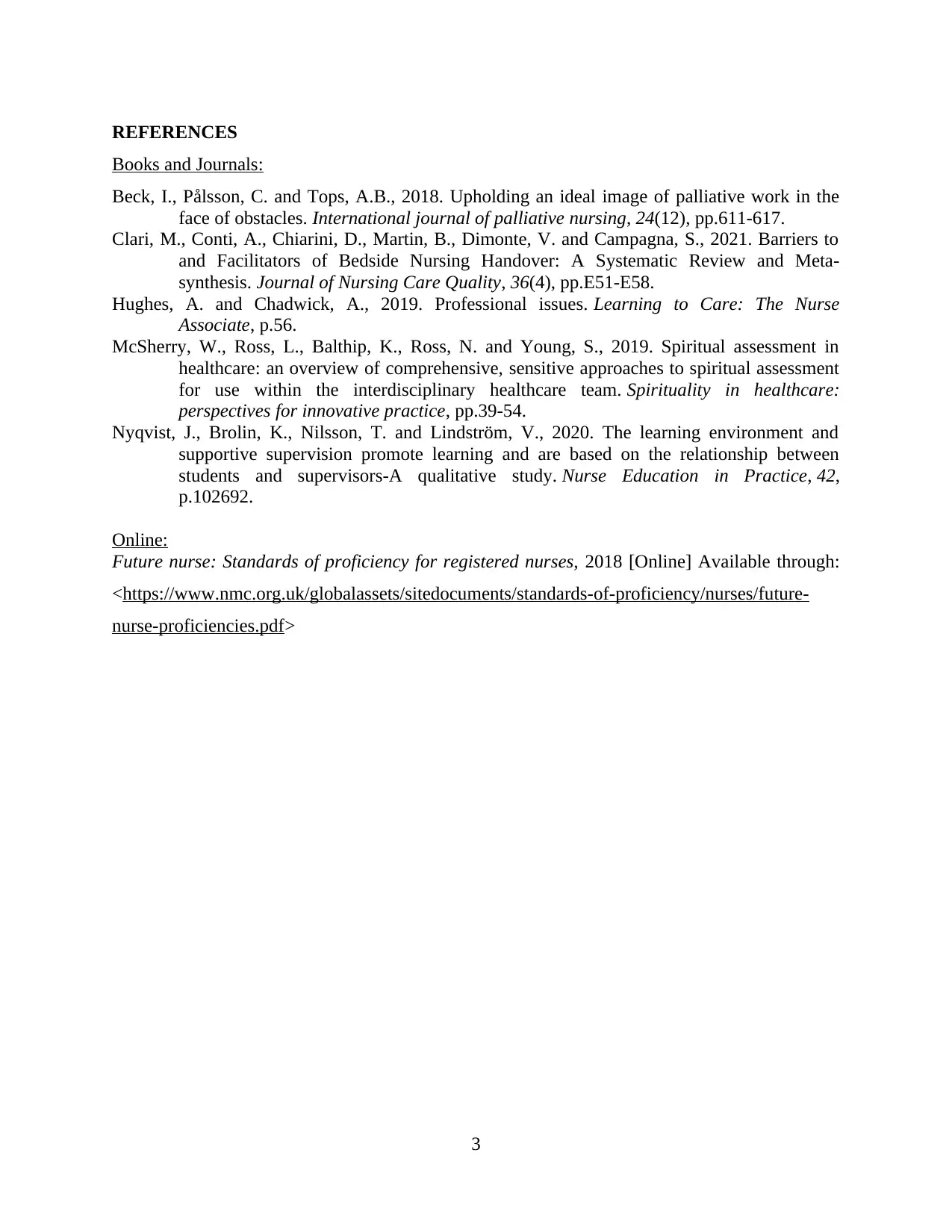
REFERENCES
Books and Journals:
Beck, I., Pålsson, C. and Tops, A.B., 2018. Upholding an ideal image of palliative work in the
face of obstacles. International journal of palliative nursing, 24(12), pp.611-617.
Clari, M., Conti, A., Chiarini, D., Martin, B., Dimonte, V. and Campagna, S., 2021. Barriers to
and Facilitators of Bedside Nursing Handover: A Systematic Review and Meta-
synthesis. Journal of Nursing Care Quality, 36(4), pp.E51-E58.
Hughes, A. and Chadwick, A., 2019. Professional issues. Learning to Care: The Nurse
Associate, p.56.
McSherry, W., Ross, L., Balthip, K., Ross, N. and Young, S., 2019. Spiritual assessment in
healthcare: an overview of comprehensive, sensitive approaches to spiritual assessment
for use within the interdisciplinary healthcare team. Spirituality in healthcare:
perspectives for innovative practice, pp.39-54.
Nyqvist, J., Brolin, K., Nilsson, T. and Lindström, V., 2020. The learning environment and
supportive supervision promote learning and are based on the relationship between
students and supervisors-A qualitative study. Nurse Education in Practice, 42,
p.102692.
Online:
Future nurse: Standards of proficiency for registered nurses, 2018 [Online] Available through:
<https://www.nmc.org.uk/globalassets/sitedocuments/standards-of-proficiency/nurses/future-
nurse-proficiencies.pdf>
3
Books and Journals:
Beck, I., Pålsson, C. and Tops, A.B., 2018. Upholding an ideal image of palliative work in the
face of obstacles. International journal of palliative nursing, 24(12), pp.611-617.
Clari, M., Conti, A., Chiarini, D., Martin, B., Dimonte, V. and Campagna, S., 2021. Barriers to
and Facilitators of Bedside Nursing Handover: A Systematic Review and Meta-
synthesis. Journal of Nursing Care Quality, 36(4), pp.E51-E58.
Hughes, A. and Chadwick, A., 2019. Professional issues. Learning to Care: The Nurse
Associate, p.56.
McSherry, W., Ross, L., Balthip, K., Ross, N. and Young, S., 2019. Spiritual assessment in
healthcare: an overview of comprehensive, sensitive approaches to spiritual assessment
for use within the interdisciplinary healthcare team. Spirituality in healthcare:
perspectives for innovative practice, pp.39-54.
Nyqvist, J., Brolin, K., Nilsson, T. and Lindström, V., 2020. The learning environment and
supportive supervision promote learning and are based on the relationship between
students and supervisors-A qualitative study. Nurse Education in Practice, 42,
p.102692.
Online:
Future nurse: Standards of proficiency for registered nurses, 2018 [Online] Available through:
<https://www.nmc.org.uk/globalassets/sitedocuments/standards-of-proficiency/nurses/future-
nurse-proficiencies.pdf>
3
1 out of 5
Related Documents
Your All-in-One AI-Powered Toolkit for Academic Success.
+13062052269
info@desklib.com
Available 24*7 on WhatsApp / Email
![[object Object]](/_next/static/media/star-bottom.7253800d.svg)
Unlock your academic potential
Copyright © 2020–2026 A2Z Services. All Rights Reserved. Developed and managed by ZUCOL.





